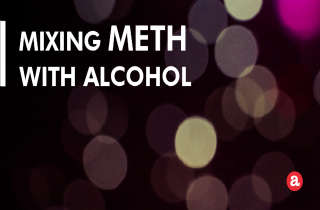Methamphetamine – known as “meth” for short and as Desoxyn for medical use – is a stimulant that affects the brain, body, and nervous system. Alcohol, on the other hand, has depressive effects. Separately, both meth and alcohol can have very detrimental long-term effects to the body, including developing meth dependence.
But what happens when you mix these two drugs together (injected, swallowed, or snorted meth while drinking)? We review here and invite your questions about mixing meth with alcohol or how to help meth addiction in the comments section at the end.
Meth and alcohol effects
Many people take meth with alcohol while on a binge. But when meth and alcohol are used together, the drug effects of both are amplified, including increased heart rate and an increased sense of euphoria.
Alcohol’s sedative properties counteract some of the stimulant effects of meth. For example, alcohol can reduce sleep disturbances associated with meth use. Though meth increases the user’s heart rate on its own, mixing with alcohol increases the heart rate more. Meth alone can be dangerous to the heart and mixing with alcohol increases the risk for cardiovascular issues. Additionally, some users have reported some negative side effects to combining meth and alcohol, such as intense nausea and vomiting following the comedown. Some users have also reported a very intense “crash,” or depressive period following combination, including thoughts of suicide.
Dangers of mixing meth and alcohol
Meth counteracts the effects of alcohol intoxication, diminishing the feeling of drunkenness, impaired performance and mood issues. With diminished effects of intoxication, a person may drink much more alcohol than they normally would to achieve typical effects. A person on meth and alcohol can also underestimate their level of intoxication and increase in risky behavior like driving. Increased alcohol intake also increases potential for alcohol toxicity.
Meth and alcohol overdose
Meth diminishes some of the feelings of alcohol intoxication, which can encourage the user to drink more and consequently increases the risk of alcohol poisoning. Signs of alcohol poisoning include:
- irregular or slow breathing
- paleness or bluish skin color indicating hypothermia
- seizures
- unconsciousness where a person cannot be roused, stupor, or coma
- vomiting
Meth and alcohol deaths
With diminished effects of intoxication, a person may drink much more alcohol than they normally would. A person may underestimate their level of intoxication and increase in risky behavior like driving. Increased alcohol intake also increases potential for alcohol toxicity. Not only is the potential for alcohol poisoning greater, but also the possibility of death by car accident, choking on vomit, etc.
Is it safe to drink on meth?
No. It’s not safe to drink on meth. Even though mixing meth and alcohol seems to increase the “good” effects of both drugs, it is not safe to use methamphetamine and alcohol together. Meth reduces impairment commonly associated with alcohol, and the user may underestimate their true level of intoxication, leading to the danger of alcohol overuse. It is not safe to combine the two drugs.
If you are looking for help with meth (Desoxyn) and alcohol abuse or addiction, you can find answers to your many questions and learn what happens during addiction treatment programs in our comprehensive guide on Treatment and Help for Desoxyn Addiction.
Mixing meth and alcohol questions
Still have questions about meth or alcohol or both? Leave them in the comments below and we’ll work to answer them as quickly as we can.









Related Posts